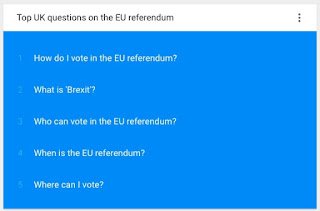"What is the EU?" is the second top UK question on the EU since the #EURefResults were officially announced
 |
June 24, 2016 A
remain supporter stops to talk to people as he walks around with his
European flag across the street from the Houses of Parliament in London. Matt Dunham/AP
|
"Even though I voted to leave, this morning I woke up and I just — the reality did actually hit me," one woman told the news channel ITV News. "If I'd had the opportunity to vote again, it would be to stay."
[The critical fact Trump forgot in his viral speech on Brexit]
That confusion over what Brexit might mean for the country's economy appears to have been reflected across the United Kingdom on Thursday. Google reported sharp upticks in searches not only related to the ballot measure but also about basic questions concerning the implications of the vote. At about 1 a.m. Eastern time, about eight hours after the polls closed, Google reported that searches for "what happens if we leave the EU" had more than tripled.
 |
| (Google Trends) |
 |
| (Google Trends) |
The run-up to the vote was marked by a bitterly divided campaign, one that was as much about immigration fears as it was about the global economy.
[Live updates: Brexit]
But despite the all-out attempts by either side to court voters, Britons were not only mystified by what would happen if they left the E.U.— many seemed not to even know what the European Union is.
 |
| "What is the EU?" is the second top UK question on the EU since the #EURefResults were officially announced |
What is the E.U.? To be fair, that question will now take on a much deeper significance than perhaps Google's users realized when they typed that into their browsers.
Video :
After months of campaigning, the "Leave" camp has won and Britain will be leaving the E.U. The Post's Adam Taylor talks about what that means for the country and Europe. (Adam Taylor,Jason Aldag/The Washington Post)






































